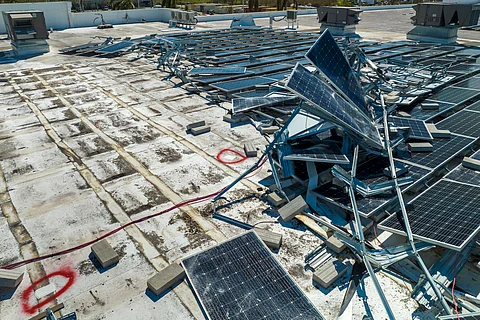

The Gujarat Energy Development Agency (GEDA) has invited tenders for solar waste recycling in the state, as part of a broader plan to establish standardised protocols.
Under this initiative, various research organisations will examine valuable materials extracted from solar and electronic waste. Notably, Gujarat hosts the highest number of solar module manufacturers in India and is home to several large-scale solar projects.
Binit Das, Programme Manager at the Centre for Science and Environment’s (CSE) Renewable Energy division, commended Gujarat’s timely and commendable effort to set recycling standards, especially given the state’s leading role in solar manufacturing and deployment.
“GEDA’s primary objective is to create a robust, eco-friendly recycling framework, addressing the growing solar waste generated as panels reach the end of their lifespan in India’s rapidly expanding solar sector,” Das stated.
Das highlighted that the state’s proactive approach reflects its commitment to assessing recycling feasibility and material recovery methods. However, he cautioned that without enforceable regulations, industry buy-in, and infrastructure support, the initiative’s impact may remain limited.
GEDA has invited technically and financially capable firms to submit feasibility reports and research studies on recycling materials like silicon, copper, silver, aluminum and rare metals found in solar panels and e-waste.
The research will cover various photovoltaic technologies, including cadmium telluride (CdTe), CIGS, crystalline silicon panels, and TOPCon cells, which require specialised processing due to their multi-layered structures.
The project will involve large-scale sampling of waste, particularly damaged solar modules, to test separation techniques.
A detailed research paper is expected to outline efficient recovery methods and the economic feasibility of scaling such processes in Gujarat and nationwide.
The study will also contribute to guidelines on safe dismantling, regulatory compliance, environmental standards, and worker safety protocols. Additionally, a regulatory body will assess existing national and state laws, recommending policy changes to enable solar waste recycling infrastructure in Gujarat.
India, aiming for 500 GW of renewable energy capacity by 2030, faces a mounting solar waste crisis. Industry estimates suggest tens of thousands of tons of panel waste could accumulate by the decade’s end.
A 2024 report by the Council on Energy, Environment, and Water (CEEW) noted that India’s 66.7 GW installed capacity (as of FY2023) generated nearly 100 kilotons of waste, projected to rise to 340 kilotons by 2030. Cumulative solar waste is expected to grow 32-fold between 2030 and 2050.
Das emphasised that the plan’s success hinges on immediate policy coordination between the Central Power Ministry, Ministry of New and Renewable Energy, Central Pollution Control Board, and state agencies.
He urged Gujarat to integrate circular economy principles into its renewable energy policies, ensuring recycling does not become a weak link in its clean energy transition.